Sharp 65EQ3EA Review
Sharp's QLED TV puts in a good performance at an affordable price
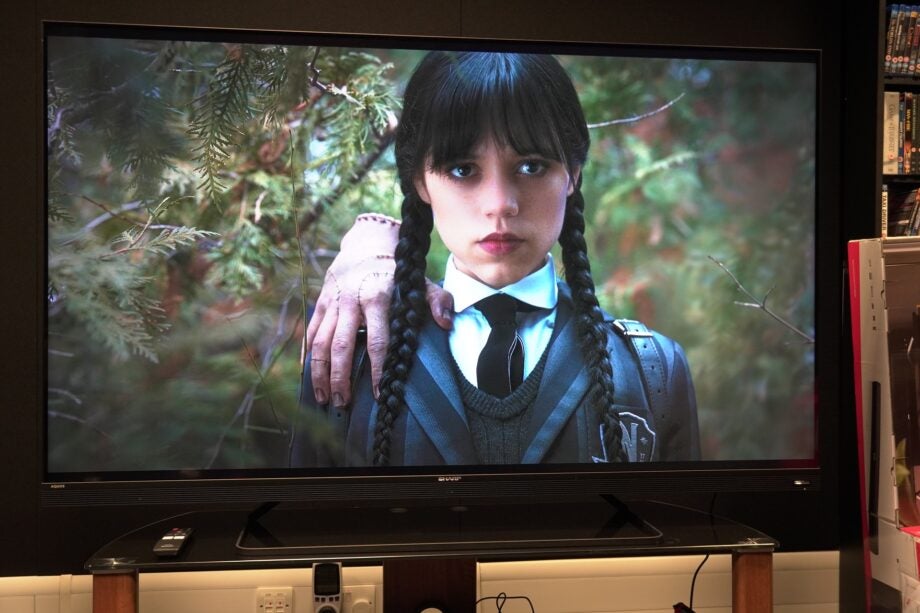

Verdict
The Sharp 65EQ3EA is a big-screen QLED at an affordable price that’s a good alternative to the likes of Samsung. It delivers enjoyable picture and sound and is backed up by Android TV for smarts. It’s close to being a skilled all-round performer at its price point, were it not for its lacklustre gaming skills.
Pros
- QLED TV with Dolby Vision support
- Big, spacious Harman Kardon sound system
- Android TV offers plenty of apps
- Affordable for a 65-inch TV
Cons
- Below average gaming skills
- Red push to complexions in Dolby Vision
- Black levels can look washed out
Availability
- UKRRP: £769.99
- USAunavailable
- EuropeTBC
- Canadaunavailable
- Australiaunavailable
Key Features
- HDMI 2.1VRR, ALLM and eARC supported
- Android 11Features Google Assistant, Chromecast and Google Stadia
- HDRHLG, HDR10 and Dolby Vision
Introduction
QLED TVs are synonymous with Samsung, but they’re not the only company that makes them. The Sharp 65EQ3EA hails from the same DNA pool and is available at an attractive price for a 65-inch screen.
With Android smarts, Dolby Vision HDR support and kitted-out sound system from Harman Kardon, the 65EQ3EA is a considerably different proposition from Samsung’s cheaper QLED TVs. Sharp has slowly been making a comeback into the TV market, so just how much of a contender is the 65EQ3EA?
Design
- Integrated sound system
- Slim and neat design
- Average viewing angles
The Sharp 65EQ3EA is conceived of as an all-in-one TV, a picture and sound combo like fellow Quantum Dot TV Sky Glass. That approach informs the design whereby the area below the screen is where the Harman Kardon sound system resides, and the pedestal stand below that juts out in front makes adding a sound system rather reductive. Sharp’s thinking is that the sound system is good enough on its own.
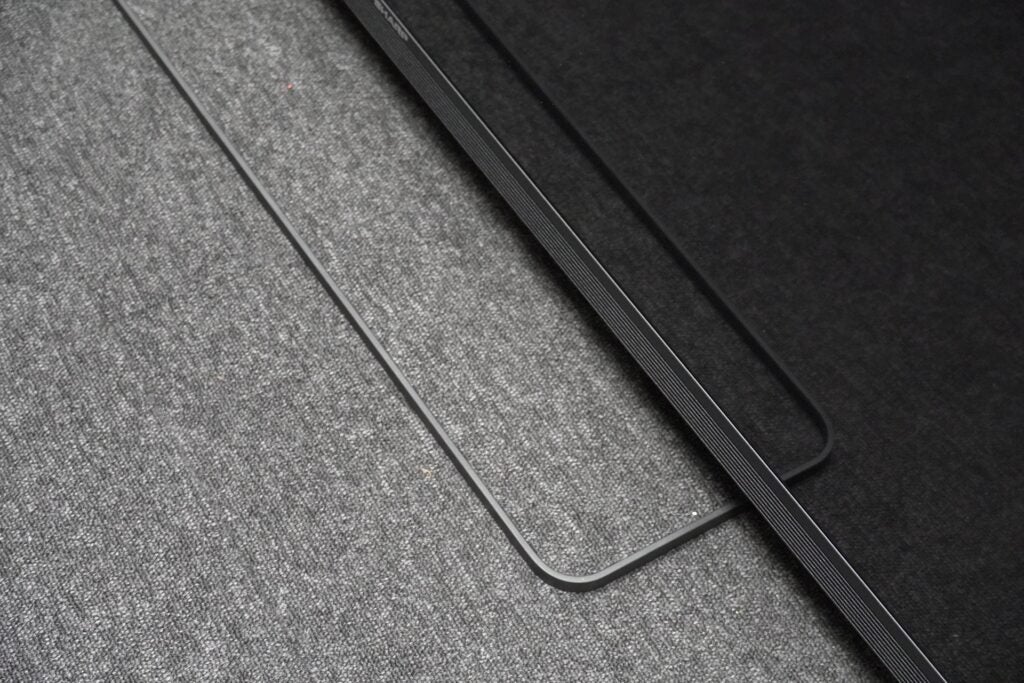
The overall aesthetic is one that’s neat and slim with its aluminium-alloy construction. The depth of the screen is only 61mm, which should make for a positive impression when installed on a wall. Connections are side- and downward-facing.
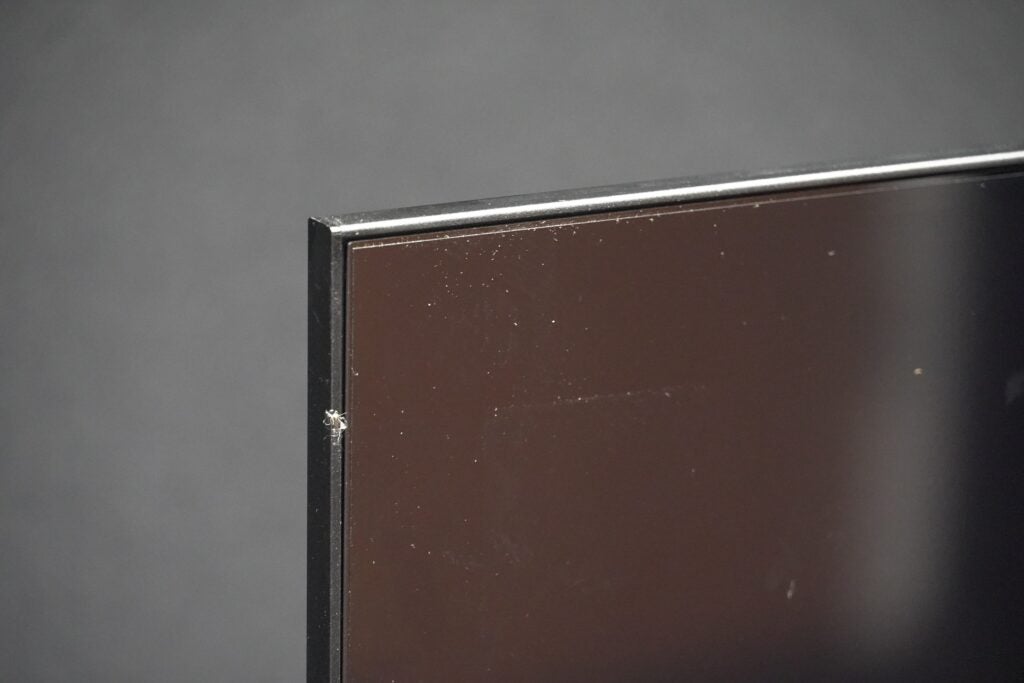
Assembling the TV’s stand ought to be simple, but takes longer than expected in figuring out how the pieces come together.
Nevertheless, the stand easily accommodates the 20kg weight of the screen, while its central position also makes it easier to place on TV racks and other AV furniture. There’s also an EQ4 model Sharp sells that’s the same, but decked with a silver front grille across the internal speaker.
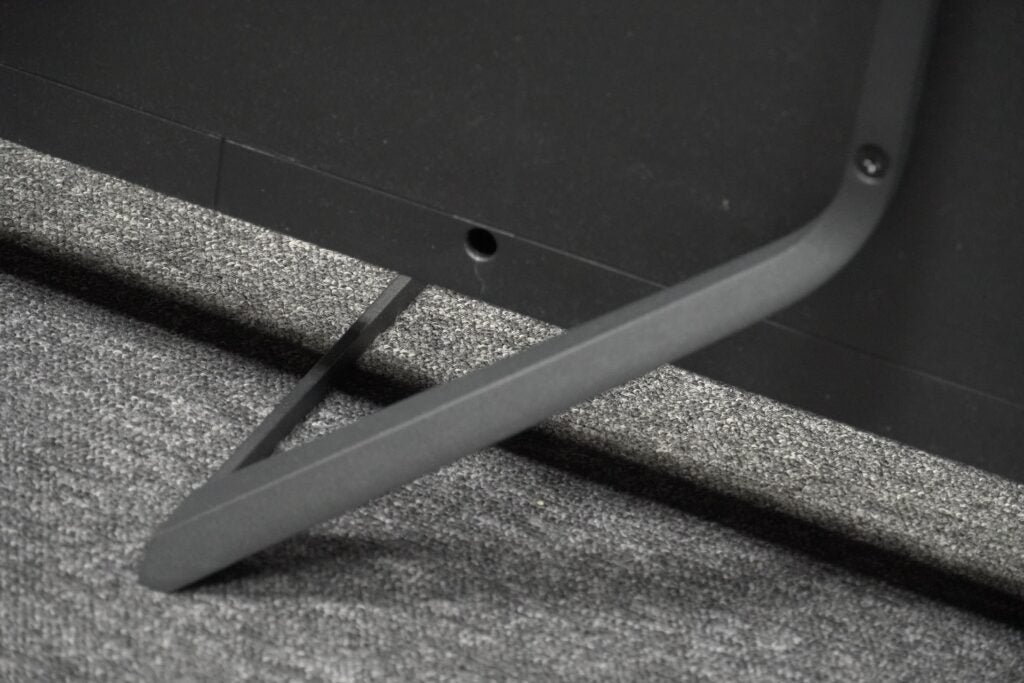
Using a VA panel with a Direct LED backlight, it has a Quantum Dot filter to help produce a wide range of colours. Viewings from wider angles are average, as it only takes a few steps off-axis for black levels and colours to retreat.
Android TV interface
- Support for major streaming apps via Android TV
- Freeview Play
- Packaged with two remotes
Android 11 is the OS of choice, with Sharp deciding against Google TV UI for now. It’s a logical call, but Google TV’s UI is an improvement in content curation. Android TV’s main weakness has always been that content steered your way is not all that personal.
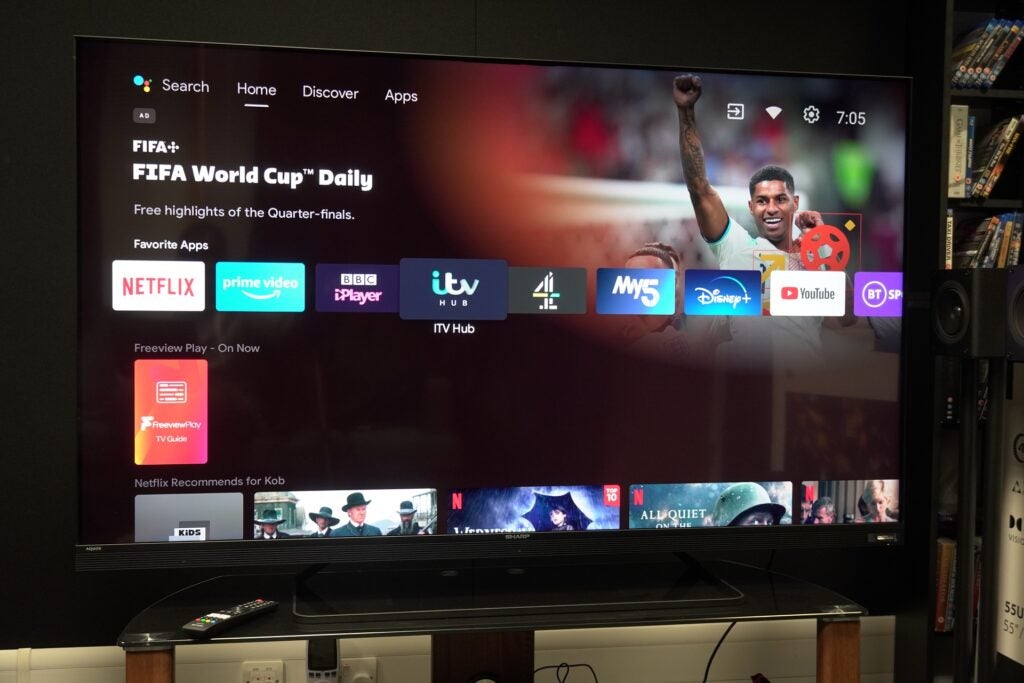
Still, the Home screen is neatly ordered, and the Play Store is home to many apps in the likes of Netflix, Prime Video, Disney+, Apple TV+, Spotify, Lionsgate+, Discovery+, Deezer and Tidal. There’s no shortage of entertainment options and little need to add a streaming stick. Freeview Play adds the UK catch-up and on demand apps such as iPlayer, ITVX or PBS America.
Google Stadia is no more, but Android bakes in Google Assistant voice control and Chromecast to stream content to the TV.
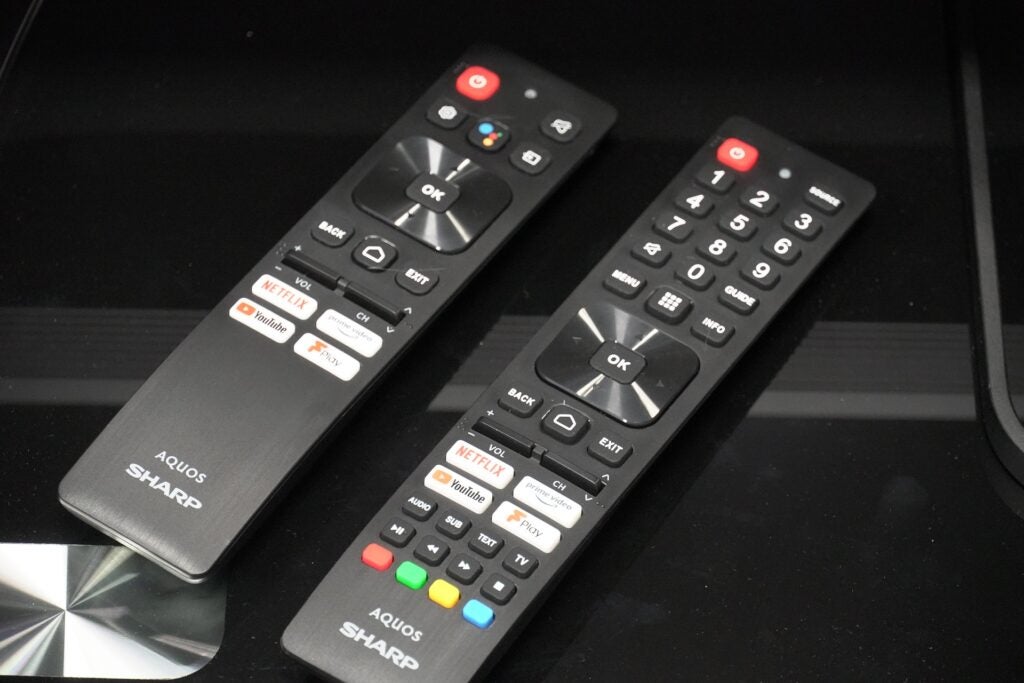
Sharp ships the EQ3 with two remotes, one a more traditional effort, the other with fewer buttons and integrated voice control activation. Both remotes feel light in the hand and responsive, the cushy feedback of presses acts as a nice interaction with the screen.
Features
- Average performance for gamers
- eARC support for external sound systems
For gamers there’s auto low latency mode that sets the TV in its most receptive (and quickest) state for gaming. Despite that the 65EQ3EA is no Usain Bolt off the starting line, with latency measured at 118ms in 4K and 50ms at 1080p in its game mode. Casual gamers only need apply with this Sharp.
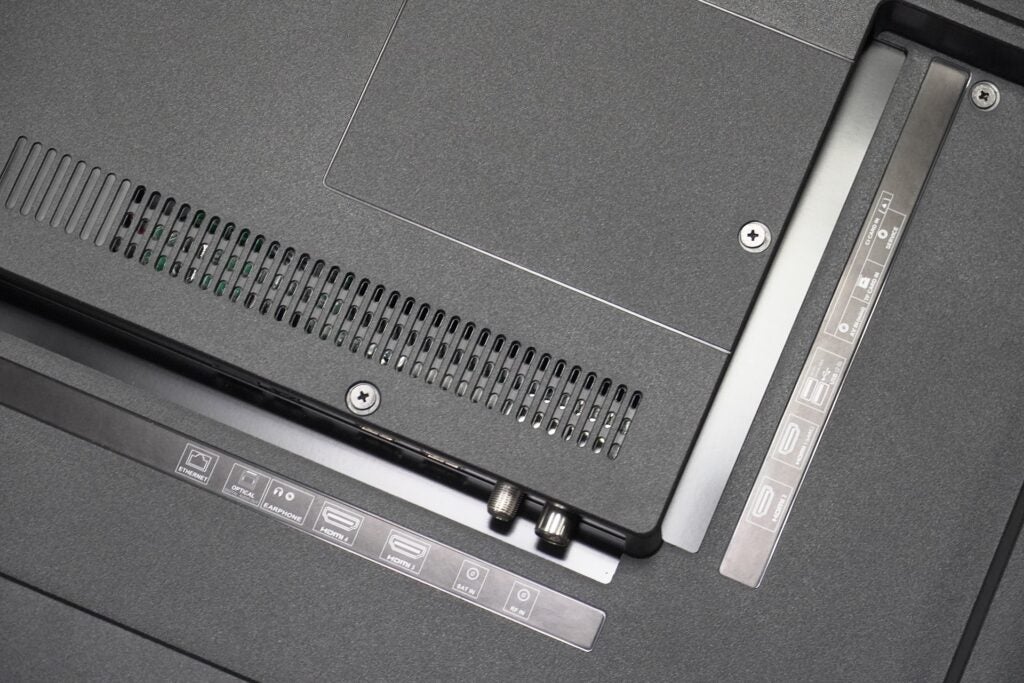
Connections include four HDMI 2.1 (at 60Hz), with eARC located on HDMI 1 that allows for pass-through of higher quality audio from the TV to a soundbar/sound system. Two USB ports, mini composite CVBS + Audio input, 3.5mm headphone jack, digital optical out, ethernet, antenna and satellite inputs plus a microSD slot make up the rest of the connections.
Picture Quality
- Colourful image
- Blacks are a little grey
- Reddish push to complexions in Dolby Vision
Samsung’s never been a big fan of Dolby Vision, which is why it’s refreshing to see it on this QLED. The aim of Dolby’s HDR format is to assist in producing as accurate a representation of content as it can, though I’m not sure the Sharp’s Dolby Vision presentation is as accurate as it could be.
There’s a red push to complexions, visible in the faces of characters in Stranger Things or Disney Plus show Extraordinary. While there is, in some cases, a naturally reddish glow to these characters, the Sharp overly accentuates to the point where it feels they’ve come back from a sunny holiday in Côte d’Azur.
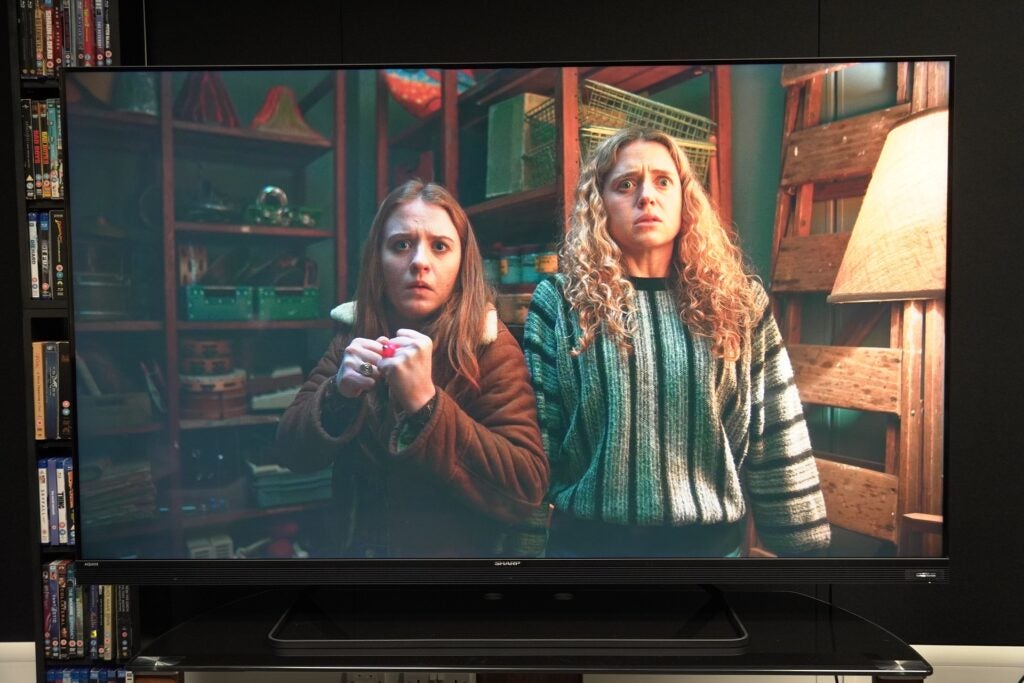
That’s a minor rather than major fault. In general, Dolby Vision produces a varied, colourful, and contrasting picture with Netflix’s Wednesday, especially in the moments showing the divide between Enid and Wednesday’s sides of their dorm room.
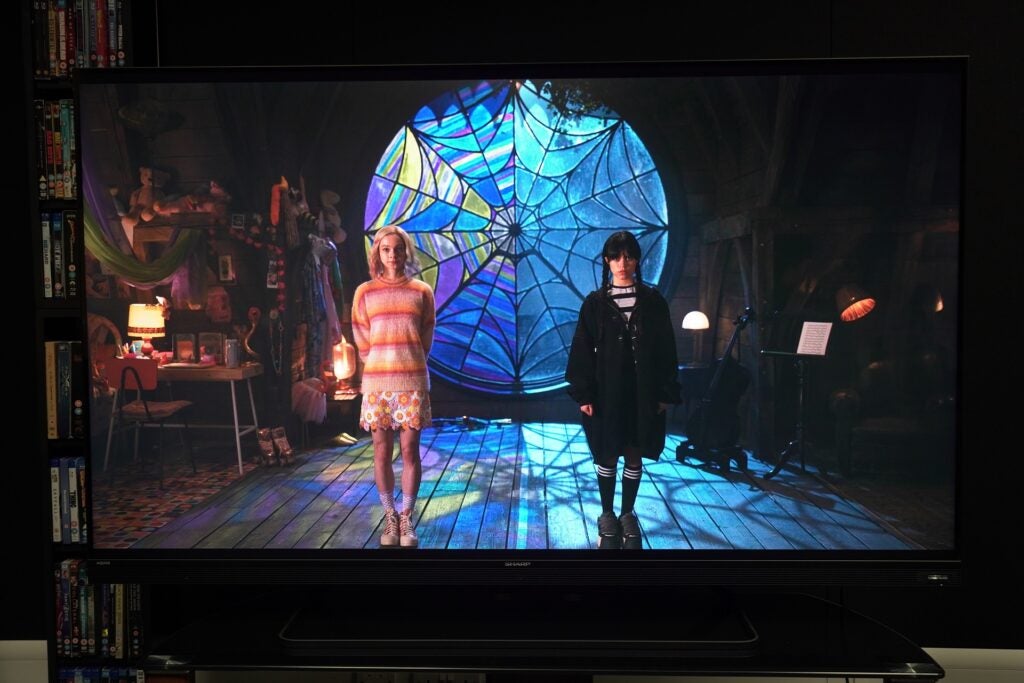
Actual contrast does appear to be lacking, black levels aren’t the firmest whether the TV is describing Wednesday’s dark and moody attire, or scenes set at night. Colours do suffer a little vibrancy from the less than solid black levels, failing to properly pop against them. Nevertheless, compared to the Samsung UE65BU8000, the Sharp puts in a more varied and punchier colour performance.
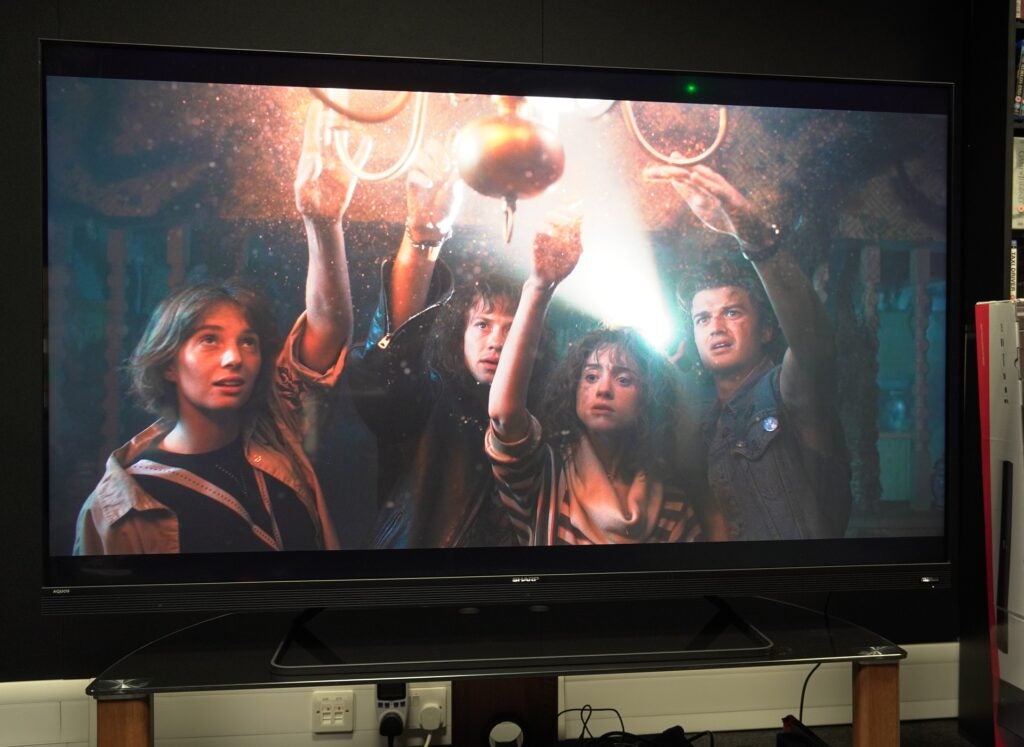
The slightly washed-out blacks are likely a consequence of the Direct LED backlight with its array of LED lights spread across the screen which are always “on”. Without the dimming ability more expensive TVs have in turning those LED lights off, black levels can lack depth and solidity.
Peak brightness is respectable at 418 nits, but short of giving HDR highlights and colours intensity and punch. It’s a good effort and requires less need to fiddle with the settings than Philips’ 65PUS8807. Dolby Vision aids a title such as Stranger Things 4, as colours take on a rich and vibrant tone in daylight scenes with saturated reds and blues.
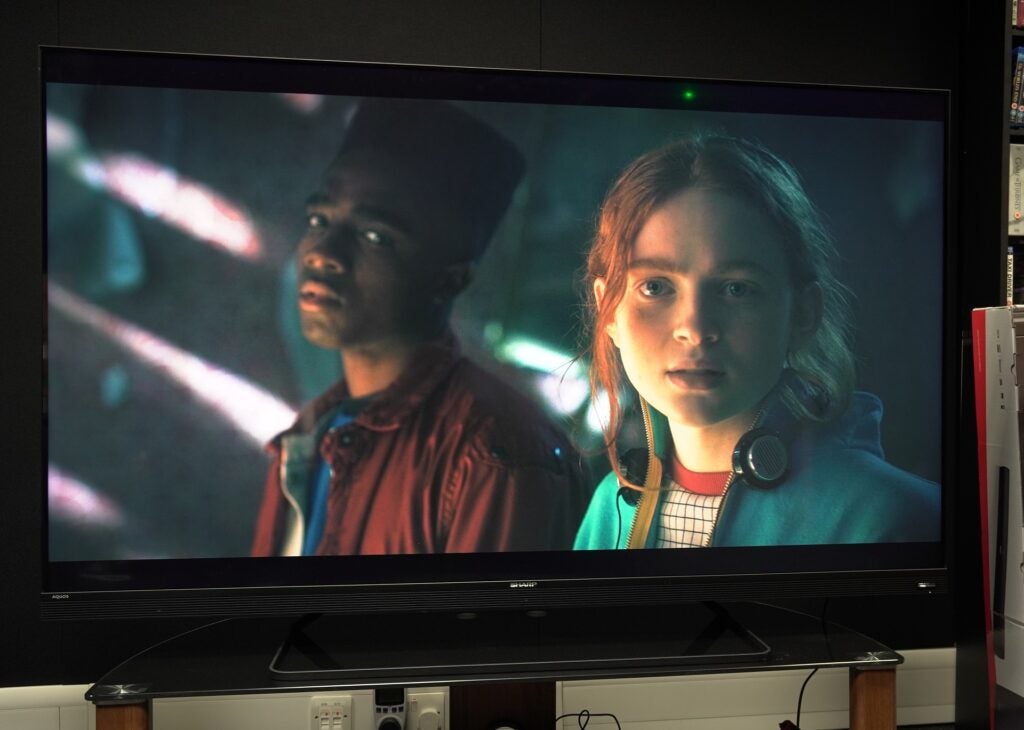
You’ll want to consider watching in Dolby Vision, though it can be a double-edged sword. Viewing Death on the Nile on 4K Blu-ray in HDR10 compared to the Dolby Vision Disney+ version and while black levels are firmer on the latter; complexions veer from vibrant to overly done (Armie Hammer’s is too red), though a plus is that colours more vibrantly conveyed, such as the red dress of Emma Mackey wears at the club in the opening scene. There’s a better sense of contrast with Dolby Vision but, curiously, less detail in the darker parts of the nightclub scene. I’d recommend pushing Dolby Vision brightness to 55 to reveal more detail.
Also noticeable in the first episode of Stranger Things 4th season is the Sharp’s motion processing abilities. Even with the MEMC setting at its lowest, it struggles a little with fast whip pans, with even some slight noise and pixelation noted with blinking lights at the beginning of the episode. Objects moving past characters can also cause some instability. I don’t find them to be massive issues, but niggly ones to the point where it’s preferable to turn motion off.
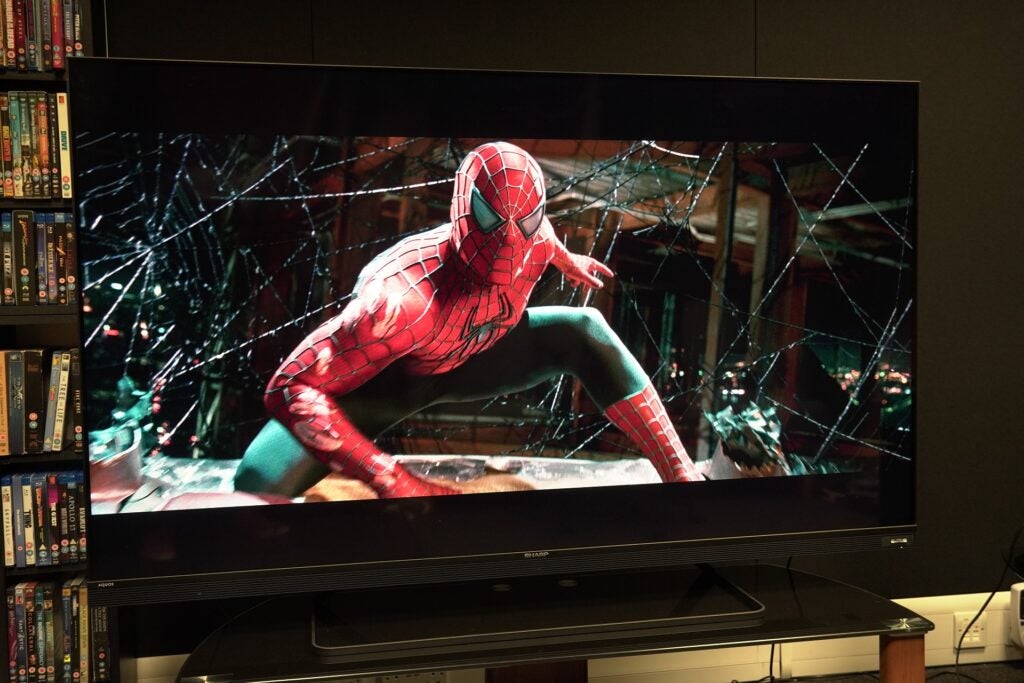
The Sharp 65EQ3EA’s upscaling varies from very good to middling depending on what you’re watching. If it’s upscaled HD content, then it’s of the “very good” standard. A Blu-ray of Spider-Man 3 presents a colourful image, with pleasing levels of clarity and detail to textures, costuming, and sets, like the fine detail of Peter’s “everyday” suit as well as “work” suit. Blacks aren’t the firmest, but are handled better than with 4K HDR content, and brightness is solid, white tones are bright enough to stand out, with good levels of contrast and black levels in the film’s darker moments.
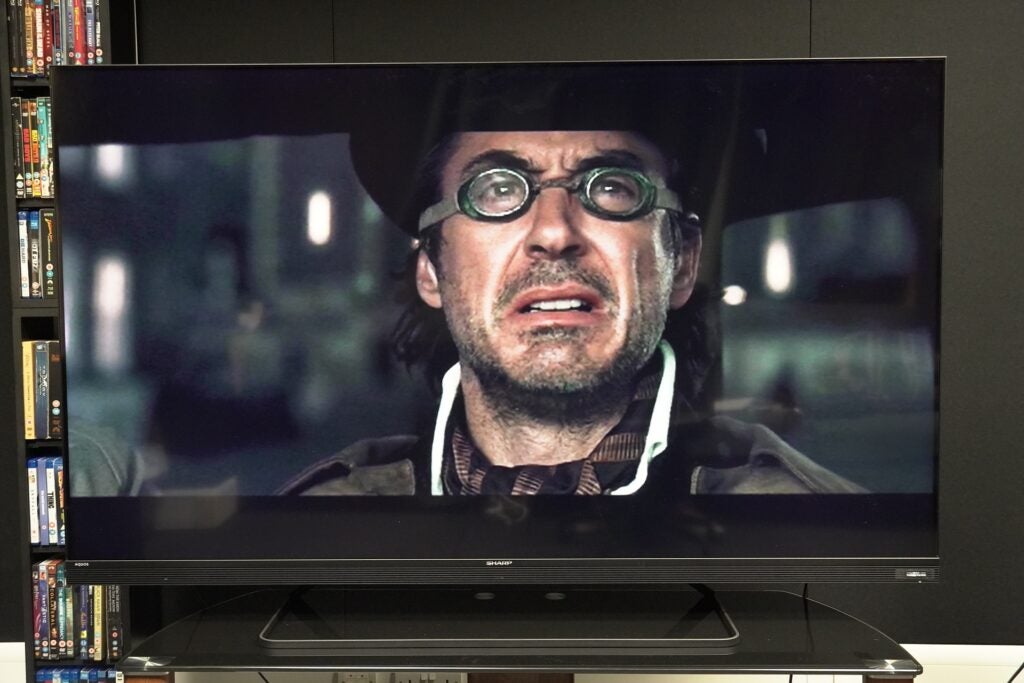
Watch DVDs and the Sharp’s AQUOS UltraClear Video Processor evidently struggles with a lack of sharpness and noise visible in Sherlock Holmes: A Game of Shadows. Edges are soft and unclear which is no surprise, but colours are well handled though, natural in appearance. The same can be said of The Big Lebowski on DVD, though there’s less noise (but still plenty of it) and some reddish complexions. Avoid watching anything less than HD resolution and you’ll be fine.
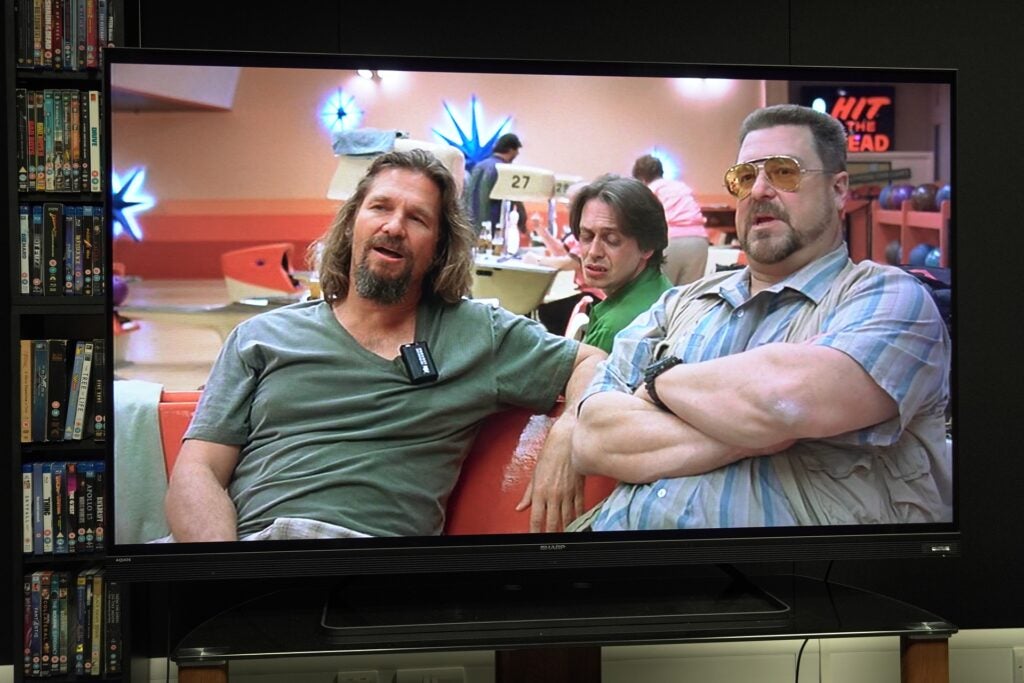
Sound Quality
- Sharp, clear performance
- Bass carries decent weight
- Dolby and DTS support
I feel I’ve come across as a little harsh on the picture, but it’s the Sharp 65EQ3EA’s Harman Kardon sound system that puts in an impressive stint.
It exercises more dynamism than more expensive Samsung QLEDs do, delivering a big performance with Dolby Atmos or DTS content and punchily expressive bass. Dialogue is consistently clear, close to if not matching its position on screen, though I found that while the Dialogue Enhancer feature does work, at its highest setting it does sound a tad less natural and slightly bassy.
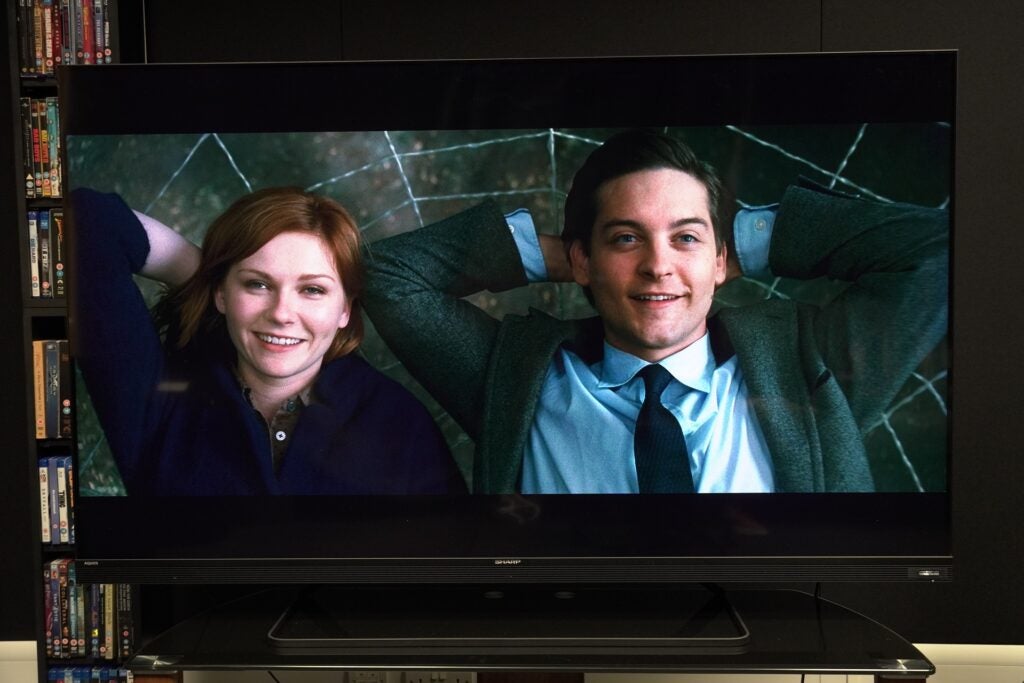
Watching Spider-Man 3, there’s also some slight sibilance to Kirsten Dunst’s voice in some scenes, but overall, I like how sharp and clear the system is, emphasising detail towards the top of the frequency to bring out detail in Christopher Young’s score or effects, such as whizzing noise of the Goblin’s pumpkin bombs.
With Atmos content, I’d recommend delving into the settings and playing with the Surround Virtualizer feature. The school rally in the first episode of Stranger Things 4 where the soundstage is more expansive, though turning it off does allow more of a focus on voices – it’s a give or take proposition.
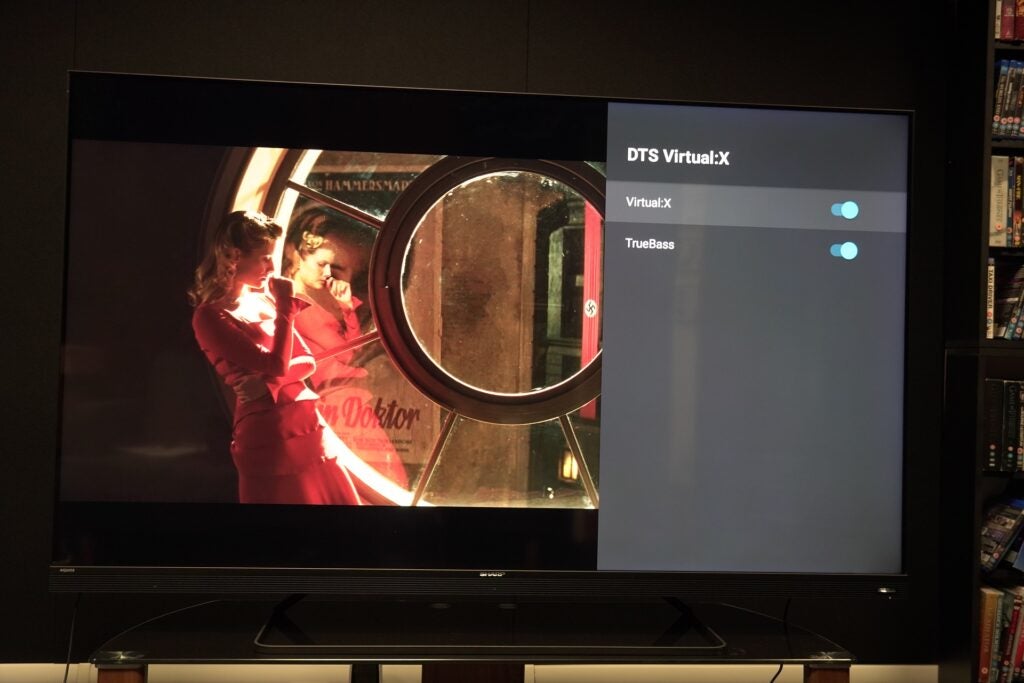
With onboard Dolby processing deactivated and DTS Virtual:X enabled (it must be manually done), the Harman Kardon system produces a similarly impressive performance. Inglourious Basterds with the TrueBass feature offers better control over the frequency range and a more balanced performance. Bass has weight, while there’s good dynamism to the music score and sound effects. This performance is much better than I’d have expected from a TV at this price.
Latest deals
Should you buy it?
An affordable QLED with a good sound system: A QLED TV at 65-inch size with solid picture performance, Dolby Vision support and a very good sound system. What’s not to like?
If you’re a gamer: The latency on this TV is one of highest I’ve encountered and it’s lacking for features now that Google Stadia has shuffled off its cloud-based coil.
Final Thoughts
If you’re looking for a 65-inch TV to watch films and TV shows on, the Sharp 65EQ3EA stands out as one of the better options at its price point. Its picture isn’t perfect, but it’s both more colourful and requires less tweaking than similarly priced and sized efforts from Samsung and Philips that I’ve tested.
The Harman Kardon sound system is also very good for a TV, let alone one at this price, delivering clear, expansive soundstage with decent bass to boot. There are smarts in its Android TV integration, as well as plenty of streaming apps, but where it suffers is in its gaming performance, which is relatively weak. The high latency means it’s best suited to casual, less competitive games.
Nevertheless, this is a very good TV package at a very respectable price. After a while in the doldrums Sharp has made a fine comeback.
How we test
We test every television we review thoroughly over an extended period of time. We use industry standard tests to compare features properly. We’ll always tell you what we find. We never, ever, accept money to review a product.
Find out more about how we test in our ethics policy.
Tested across two months
Benchmarked with tests
Tested with real world use
FAQs
We would not say the Sharp is a good TV for gamers. The latency is very high and it lacks features such as VRR for a higher quality performance. And with Google Stadia gone, there aren’t many cloud streaming apps available either. We’d only recommend it to more casual players.








